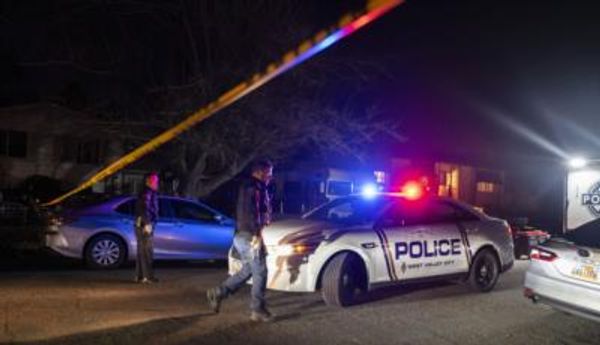
Moses Henry Cass, Moss to everyone, was born in the WA wheatbelt town of Narrogin in 1927, the son of a Jewish country town GP, a child migrant from Bialystok, now in Belarus. Ninety-five years later Moss died in Melbourne, having been a pioneering minister in media, environment and much more, an MP who turned a Liberal seat safe Labor, an innovative medical researcher, a champion of community health, a warrior against the nuclear scourge, a relentless organiser of initiatives and the diminutive beatnik-bearded patriarch of a family of activists, artists, filmmakers, fighting lawyers and more, now spread over three continents.
We farewelled Moss this week at a state memorial at the Footscray Community Arts Centre, the Maribyrnong River flowing slowly behind.
The service was led by Moss’s surviving children Dan and Naomi (widow Shirley, nee Shulman, was absent through illness), with Bill Shorten, Barry Jones, Brian Howe, Kim Carr, Mark Dreyfus, Christine Milne, Josh Frydenberg (a family friend, from the other side) and bedecorated vice-regal rep RAN Lieutenant Natasha Ellis in the audience.
With a photo of Moss resplendent in biblical-beatnik beard hanging behind, Bob Brown, Brian Howe, Rabbi Jonathan Keren-Black and Moss’s co-biographer Anthony O’Donnell recalled to mind the third-last surviving full-term Whitlam government minister (Doug McClelland, 96, and Bill Hayden, 89, have withdrawn from public life; Race Mathews, Whitlam’s young consigliere, is still spry; Paul Keating was Northern Australia minister for a week in November 1975) and his work — work that was overshadowed for decades by the Sturm und Drang of the dismissal/coup, and whose extraordinary influence and impact is now becoming visible.
When the word meant something
“Moss was a socialist,” Howe roared in his speech. “Socialism is the key to everything he did.” (The media didn’t make it to the service, but The Age had two 1500-word reviews of new streaming shows in the one edition two days later, so good to see them covering this city.)
Moss was a socialist and more, an envoy from that extraordinary period, the middle of the 20th century, when for a moment radical possibilities took power and made possible much that we now live by. In farewelling him, a lot of us were farewelling the politics that made us, even if that was at the knee of parents who marched in moratorium protests and raged at the TV during the dismissal/coup. This tribe may not gather again in this way.
“Moss thought the point of power was to use it,” O’Donnell noted. “Something some other people could think about.”
It wasn’t the first kick the outgoing government would get that day. Some will know the story, or some of it, about how the impish, Jewish member for Maribyrnong made it into the Whitlam ministry, 26th of 27 elected by caucus, and was given the “tin-pot” portfolio of environment by Gough, who was never a fan.
Moss turned it into a powerhouse, pioneering the environmental impact statement, taking up the fight to save Lake Pedder (which launched the Australian green movement), fighting the scourge of nuclear waste (as welcome elder Uncle Ringo Terrick remarked is notable for its devastating effects on Aboriginal communities). In opposing sand mining on K’gari (Fraser Island) Moss laid the basis for the 1983 Franklin Dam challenge, which would bring matters of the earth to the centre of politics.
How to make change
Moss pioneered community health, setting up the trade union clinic at the request of Wally Curran, and fought for a full socialised health system, rather than hybrid Medicare, with the (now battered) community health clinics the result. There he is in photos of the Whitlam ministries, the neatly coiffed, spade-bearded boho among a bunch of men who look like homicide squad detectives. After he moved to the media ministry in mid-1975, in four months — four months — he established the Australian Press Council (aimed at all media, but, eh, Murdoch, he hoped it would have more, or some, teeth), the path to SBS, and issued community radio licences, whose cultural effect would be difficult to overestimate. Much of it was done against great resistance, from within and without.
Whatever the “new left” was, Moss was its most effective representative in the halls of power for those three short, productive years. That extraordinary movement, coming out of the war against fascism, and determined to challenge a technocratic “civilisation” that was making plans for the next, challenged our assumptions about how we were living, at its roots, in ways that made much of the world we now enjoy.
That did not always fit easily with a social democratic movement in 1970s Australia. In the cups of opposition after 1975, John Button once recalled, shadow cabinet was discussing whether or not to back a Fraser government interstate roads bill — “We’re not asking,” Moss is recorded as saying, “what we need roads for?” — before noticing that Whitlam was turning purple, roaring, “I’ve had about enough of this shit!”
Moss and the rest of the Victorian branch had not been popular with those convinced by nine defeats that power could be won only by conceding that in 23 years in the wilderness some possibilities had been lost. There are one or two remnant veterans of those party wars who might be having a yell at this as they read. But as Bob Brown reminded us: “Moss’ attitude to the world was informed by the Jewish idea of care … He wanted us to look after this garden, this green place which may be the only example of intelligent loving life in the universe.”
Not that Moss was any sort of Luddite. His great achievement in medical research was in the refinement and use of the heart-lung bypass machine, of which he was a pioneer, before he went into politics — his first tilt being to stand against Robert Menzies in Kooyong on an unashamedly left platform, which forced the old bruiser to defend his politics in town meetings across the electorate and took a 3% swing off him. In the three years as an opposition backbencher, before Labor gained government, he argued for legalised abortion, homosexuality, smashing censorship and much more.
Not that way, this way
Moss was ceaselessly active, intellectually and politically, after leaving Parliament in 1983, co-founding the Australian Jewish Democratic Society (to provide an alternative voice to the hyper-Zionism of other Jewish peak bodies) and Earthworker, which sought to overcome the engineered antagonism between environment and union movements. The name expressed everything about the politics he drew on, in that extraordinary time when Labor did host some sort of civilisational questioning of how we should live and whether we could live in a better way.
As grandchildren followed children, then great-grandchildren, to swell the North Carlton barrio they had moved to, a house and old stables around a courtyard — the Cass-Shulman clan, prodigiously multi-talented, are less a Wes Anderson film than a Wes Anderson film festival — the true impact of Moss’s pioneering work began to unfold.
Thus, as regards “all this shit”, Moss was right, and others were wrong, and as some of that era’s obsessions have stayed in the middle distance, Moss’s imperatives have become the plain common sense of the present and the truth of the future.
Props to Frydenberg, who showed honour and integrity in turning up (and pushing to get state memorial status for the event), because there were half-a-dozen digs at the government he represented. Poor bloke. He has been deposed, in Kooyong, by a doctor campaigning on climate change, taking up the path made from the very start of Moss’s political life. The disaster at the centre of his life was ours and Moss’ vindication. Done without malice, it was also without mercy, as it had to be, to be successful. It is almost too extraordinary to think of, the audacity of events. Reality has an imagination far beyond all fictions, and as the man said, facts are better than dreams.
You can have too much of that reality, for your own and others’ good. There were times in his later decades when Moss lost that path and wandered into night. A man of action and short essays, he could not complete his political memoirs, until Vivien Encel and O’Donnell helped him to its conclusion. The intensity of his drive for change in a world going backwards took him through melancholy to a rawer guilt, which threatened at times to engulf him — bright star becoming black hole, drawing those close in.
Moss, like many of his era, was given a force by the times he lived through. Not every era grants that to its tenants; thwarted, creation becomes destruction. Shirley and Moss’s loss of their daughter Deborah to cancer had the usual, irredeemable effect it must have on anyone who has ever had anything worth losing. But in his last year, a brightness and gratitude broke to dispel much of a longer dark.
We mourned and celebrated Moss and the era that had formed many of us there and, I suspect, many reading this now — the hopes that now seem near gluttonous in their lack of restraint; the era when audacity and care had not been placed in opposition to each other, when freedom was something other than choices and safety was not surveillance.
The cliché always comes at the end to keep everything else in place: as both Dan and Naomi noted, Moss would have been less than the man in full he was without Shirley, the true radical, it is said, the sharp 17-year-old who introduced the 28-year-old (you could do that then) to the new ideas in literature, film and philosophy.
In that new standard of memorial, the slideshow, there they are in black and white, two hot young Jewish kids staring out at what was to come. And one stares back at that strange middle period of modernity, the decades between suffragism and Shulamith Firestone, the mystery of the “full couple”, and of how in honouring the great man we throw a shadow over what had not yet been made possible.
But that is true of our politics altogether. The movement makes the man or woman, but sometimes the movement is in the one man or woman who has found the path. It is necessary to admit that reality if for nothing else that in some part of life that man or woman might be you, and you will need to recognise it in yourself to become who the world needs you to be.
It is funny — it is shoutingly funny and wonderful and beautiful — that our sense of possibility has been made in part by a poet wondering if from the deserts prophets still do come. And one of them did. As it turned out, his name was Moses.







